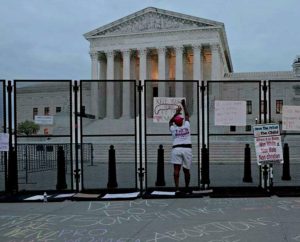Podcast: Play in new window | Download
Supreme Court Justice Samuel Alito’s Leaked Draft Opinion
In 1973, the Supreme Court held in Roe v. Wade that the Constitution protects a woman’s right to abortion until the fetus becomes viable, that is, when it can survive outside the womb (which is about 23 weeks of pregnancy). Nearly 20 years later in Planned Parenthood v. Casey, the Court reaffirmed the central holding of Roe and said restrictions that placed an “undue burden” on a woman’s right to abortion were unconstitutional.
In perhaps the most significant leak in the history of the Supreme Court, Politico published a draft opinion that Samuel Alito wrote in Dobbs v. Jackson Women’s Health Organization, which would overturn Roe and Casey. At least four other members of the Court would have to sign Alito’s draft in order to overrule the constitutional right to abortion.
But Politico also reported that, in a straw poll following oral argument in December, Clarence Thomas, Neil Gorsuch, Brett Kavanaugh and Amy Coney Barrett voted to overrule Roe, Casey and the constitutional right to abortion, and they all continue to hold that position. The Court will issue its final opinion in Dobbs by the end of June.
Although two-thirds of the American people believe that Roe should not be overturned, it appears that the Supreme Court is poised to do just that. Moreover, if the Court says that abortion is not a constitutional right, many other so-called “unenumerated rights” that are not specifically mentioned in the Constitution will also be in jeopardy.
Guest – Erwin Chemerinsky, Dean of Berkeley Law School. Dean Chemerinsky is one of the nation’s preeminent constitutional scholars. He has written 14 books, including leading casebooks and treatises about constitutional law, criminal procedure, and federal jurisdiction. He also represents clients and has argued several times before the Supreme Court.
—-
Government Agencies Delay Food Safety FOIA Requests Part 2
The US Freedom of Information Act is a 1967 federal law requiring federal agencies to disclose information to the public. The logic being: “a government of, by and for the people, is transparent and accountable to those people.” In the last half-century, FOIA requests have became critical tools for both journalists and activists seeking to illuminate federal agency activities.
However, since 2014 it’s gotten harder to wrest information from recalcitrant government agencies. Federal agencies began both heavily redacting information, or ignoring requests entirely. Delays have also been noticeably lengthier. The law gives agencies 20 business days to respond. Yet by 2019, the average wait time for a reply to your FOIA request was nearly six months (177 days).
Today’s guest experienced this frustrating process— waiting seven years for the US Fish and Wildlife service to respond. He filed his FOIA in 2014, receiving nothing for ten months, and finally a reply with much the data blacked out. This forced him to sue.
Guest – Attorney Nicholas Arrivo, managing attorney and champion of endangered species at Humane Society of the U.S.
————————




